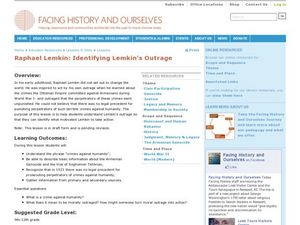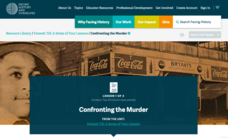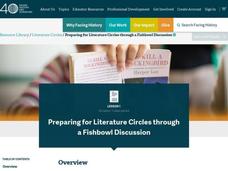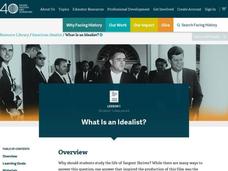Facing History and Ourselves
Continuing Lemkin's Legacy: What Can We Do to Prevent and Stop Genocide?
Young scholars investigate genocide. In this contemporary history lesson, high schoolers research Darfur advocacy organizations and present plans of action to stop the injustice in Darfur.
Facing History and Ourselves
Who Am I?
Sixth graders explore how people throughout time have responded to questions regarding identity. For this The House on Mango Street lesson, 6th graders create an identity chart for a fictional character and then write personal essays...
Facing History and Ourselves
Analyzing Historical Evidence
High schoolers examine World War I war crimes. In this world history instructional activity, learners use primary and secondary sources to research and understand the systematic nature of the Armenian Genocide. High schoolers reflect on...
Facing History and Ourselves
Eyes on the Prize Lesson 2: Six Steps for Nonviolent Social Change
Students explore the concept of nonviolent protest. For this Civil Rights lesson, students examine the attributes of nonviolent protest as they investigate the student protests that took place in Nashville in 1960-1961. Students reflect...
Facing History and Ourselves
Denial and Free Speech
Learners explore the meaning and implications of genocide. For this Armenian genocide activity, learners investigate the genocide that took place in Turkey.
Facing History and Ourselves
Raphael Lemkin: Identifying Lemkin's Outrage
Students examine World War I war crimes. In this world history lesson plan, students use primary and secondary sources to research Armenian genocide and the trial of Soghomon Tehlirin.
Facing History and Ourselves
Who Are We?
Sixth graders explore the diversity of communities. In this community-building lesson, 6th graders compose biopoems and create a classroom exhibit entitled "Who am I? Who are We?"
Facing History and Ourselves
Emmett Till: Connecting the History of Lynching to The Murder
Though the murder of Emmett Till shocked 1950's America into turning attention to the racial crimes of the South, it was far from the first time racism had erupted into violence. High schoolers examine the killing in context with the...
Facing History and Ourselves
Emmett Till: Confronting the Murder
The 1955 murder of Emmett Till is often regarded as the catalyst for the Civil Rights Movement of the 20th century. Learn more about the brutal crime—and, as many believe, the miscarriage of justice—that began a national conversation...
Facing History and Ourselves
Literature Circles: Preparing for Literature Circles through a Fishbowl Discussion
Students examine the attributes of productive conversations. In this fishbowl discussion lesson, students observe a modeled discussion of a literature circle. Students watch a discussion of "The Bear That Wasn't" and note how individuals...
Facing History and Ourselves
Interpreting the Works of Samuel Bak: Interruption
Students examine the works of Holocaust artist Samuel Bak. In this Holocaust lesson, students analyze and interpret the works of Bak that feature his first-hand childhood experience of the Holocaust.
Facing History and Ourselves
American Idealist: What Is an Idealist?
Pupils explore the concept of idealism. In this Sargent Shriver instructional activity, students watch segments of "American Idealist" and discuss the attributes of Shriver and of idealist thinking.
Facing History and Ourselves
Interpreting the Works of Samuel Bak: Self Portrait
Tenth graders explore the life of Samuel Bak. In this World History lesson, 10th graders develop a methodology for examining and analyzing works of art. Students examine art from the Holocaust and describe the experiences that the work...














